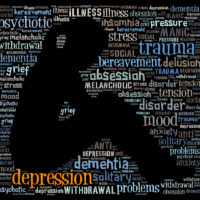Social Security Disability Benefits for Mental Illnesses and Disorders

When most of us think of injuries that prevent us from going to work, we think of illnesses or conditions that physically prevent us from doing the tasks that make up our job. Some illnesses, while invisible to outside observers, can be just as disabling. If you are suffering from a serious mental illness or disorder that makes it impossible to go to work, you may have a right to collect Social Security Disability Income. Read on to learn about SSDI benefits for those suffering from mental disorders and illnesses, and contact an experienced Alabama disability lawyer to learn more about your right to disability benefits.
Mental illnesses can be as disabling as physical illnesses
Serious mental illness can make it impossible for you to function capably in the workplace, and the Social Security Administration recognizes this fact. Just as with other forms of illness or disease, the Social Security Administration will require that an applicant for mental health-related SSDI benefits provides evidence of a diagnosis of the disorder, as well as evidence showing the ways that their diagnosis makes it impossible for them to hold down steady employment.
Numerous disorders and illnesses can result in qualifying for disability
The Blue Book, used to make determinations of disability, includes nine categories of mental illness or disorder that can qualify an individual for SSDI:
-
- Affective disorders
-
- Anxiety disorders
-
- Autism and related disorders
-
- Mental retardation
-
- Organic mental disorders
-
- Personality disorders
-
- Schizophrenia, paranoia, and psychotic disorders
-
- Somatoform disorders
-
- Substance addiction
Each individual disorder has its own set of criteria that the Social Security Administration uses when deciding if someone is entitled to benefits. Essentially, the SSA tries to determine the extent to which the disorder impacts your ability to interact with others and function in a typical work environment.
Some specific mental conditions that a person can qualify for SSD for are as follows:
Post-Traumatic Stress Disorder
An individual may suffer from post-traumatic stress disorder after dealing with traumatic and stressful situations. While some people end up with PTSD after serving in the war, others experience PTSD due to physical and mental abuse they have endured, traumatic motor vehicle accidents, and even sexual attacks that have taken place. The condition can make it hard for someone to get up each day, stick to a schedule, and complete assigned tasks at the workplace. Someone who has been officially diagnosed with post-traumatic stress disorder can benefit from applying for SSDI.
Severe Anxiety
While most people will experience a bit of anxiety at times, some people have severe anxiety that makes it hard for them to talk to others. They may feel like their chest is tight, they cannot breathe, and it is hard for them to concentrate on what is going on around them. Someone with severe anxiety may try to live a normal life only to end up frustrated because their mental health condition prevents them from doing the things that they would like to do.
Manic Depression
Manic depression is known as bipolar disorder. Someone with this condition may have periods of feeling manic, along with periods of feeling tired, exhausted, and irritable. There are times when those with manic depression cannot even get themselves out of bed because of how bad they are feeling. It can make working a traditional job quite difficult.
Attention Deficit Hyperactivity Disorder
Someone with attention deficit hyperactivity disorder would likely have a short attention span with the inability to focus or concentrate long enough on certain tasks. While it may be managed with medication, some people experience more symptoms than others, and those symptoms can make it more challenging for an individual to hold down a normal job that would require them to sit or stand for lengthy periods.
Severe Clinical Depression
Those diagnosed with severe clinical depression may have a difficult time functioning. Those with this mental health condition may go weeks without talking to others, getting a shower, or even taking care of household chores. It can take such a toll on a person while making it hard for them to get or keep a job.
Is It Harder to Get Approved for SSDI for a Mental Health Disability?
Many people believe that it is harder to get approved for SSDI for mental health disabilities because those disabilities are not noticeable like physical disabilities. However, this is not always true. It is important to provide the Social Security Administration with as much information on your mental health condition as possible.
Cumulative effect of disorders or injuries can result in disability determination
In some cases, a mental illness will be one among several conditions that, when their effects are combined, will result in a determination that you are unable to work. For example, a worker in a factory may have been injured in a car accident that resulted in difficulty standing for long periods of time, as well as occasional and sudden bouts of panic brought on by post-traumatic stress disorder. While, individually, the conditions might not be disabling enough to keep the sufferer from working, their combined effect might leave the person disabled.
If you need help applying for disability benefits in Alabama, contact the compassionate and dedicated Montgomery Social Security Disability attorneys at the Dansby Law Firm for a consultation, at 334-834-7001.


